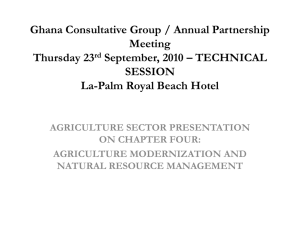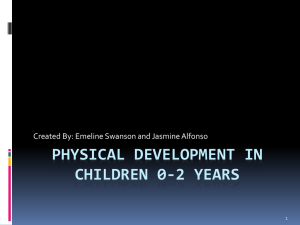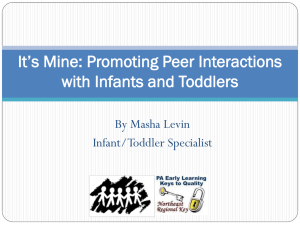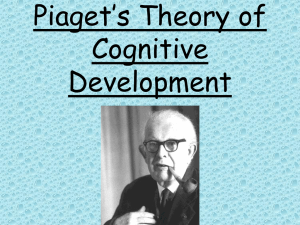English - The Program for Infant/Toddler Care
advertisement
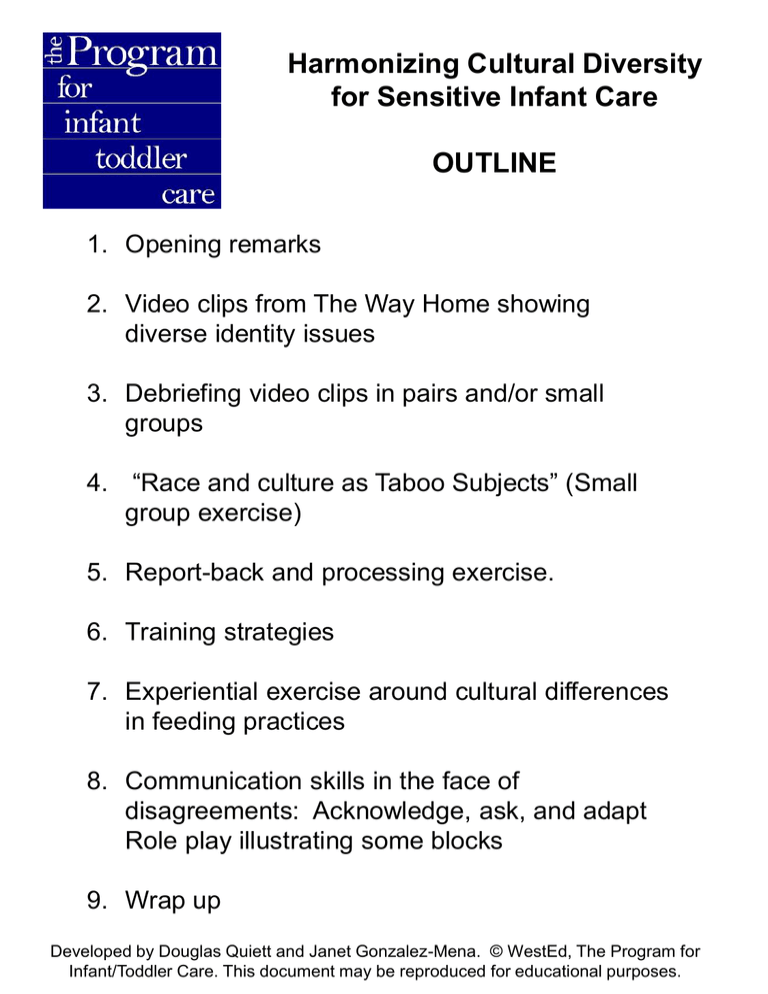
Harmonizing Cultural Diversity for Sensitive Infant Care OUTLINE 1. Opening remarks 2. Video clips from The Way Home showing diverse identity issues 3. Debriefing video clips in pairs and/or small groups 4. “Race and culture as Taboo Subjects” (Small group exercise) 5. Report-back and processing exercise. 6. Training strategies 7. Experiential exercise around cultural differences in feeding practices 8. Communication skills in the face of disagreements: Acknowledge, ask, and adapt Role play illustrating some blocks 9. Wrap up Developed by Douglas Quiett and Janet Gonzalez-Mena. © WestEd, The Program for Infant/Toddler Care. This document may be reproduced for educational purposes. Harmonizing Cultural Diversity for Sensitive Infant Care KEY CONCPETS • Understanding your own assumptions and childhood conditioning • Developing cultural responsiveness and skills in authentic dialogue • Gaining information about identity formation in infants and toddlers • Harmonizing cultural differences in childrearing practices. Developed by Douglas Quiett and Janet Gonzalez-Mena. © WestEd, The Program for Infant/Toddler Care. This document may be reproduced for educational purposes. Harmonizing Cultural Diversity for Sensitive Infant Care GOALS FOR SESSION 1. Allow participants to experience a session on diversity that goes beneath the surface into deep underlying issues of race, culture, and class. 2. Increase participants understanding of the critical role that caregivers play in the process of infants’ identity development 3. Explore with participants how stereotypes and belief systems influence each person’s ability to communicate with people different from themselves and work cross racially and cross culturally. 4. Explore cultural competency in caregiving practices and how to use a process to communicate around differences 5. Expose participants to a variety of training strategies and materials to help them plan their own workshop. Developed by Douglas Quiett and Janet Gonzalez-Mena. © WestEd, The Program for Infant/Toddler Care. This document may be reproduced for educational purposes. Culture Ethnicity Self Identity Values Beliefs Attitudes Behaviors Power Social Class Race Skin Color or Tone Racist Society Sexist Society Homophobia Cultural Ethnocentrism Racial Differences Stereotypes Differences Experiences Power Experiences Language Differences Harmonizing Cultural Diversity for Sensitive Infant Care CHILDHOOD CONDITIONING 1. No human being is born with racist, sexist and other oppressive attitudes. 2. As children, we received messages both overt and subtle that conditioned us to think about people different from ourselves in stereotypical ways. 3. The messages were not necessarily intentional. 4. We got those messages family, friends, from the society-at-large – from TV, from textbooks… 5. Our responses to stereotypes affected how we saw people, felt about them and automatically responded to them. 6. It is possible to get off of automatic, become aware of our reactions and make choices about how to respond. Developed by Douglas Quiett. © WestEd, The Program for Infant/Toddler Care. This document may be reproduced for educational purposes. Harmonizing Cultural Diversity for Sensitive Infant Care THE WAY HOME A VIDEO by World Trust Educational Services, Inc Developed by Douglas Quiett. © WestEd, The Program for Infant/Toddler Care. This document may be reproduced for educational purposes. Harmonizing Cultural Diversity for Sensitive Infant Care Processing the video in pairs and in the whole group Harmonizing Cultural Diversity DISCUSSIONS REGARDING CULTURE AND RACE • Why are race and culture taboo subjects and emotional topics to discuss in this society? • What makes you uncomfortable or comfortable about discussion culture, ethnicity and race in the following settings: A. A group of same race and culture B. An equally mixed group C. A group where you are in the minority • What is the worst thing that you can imagine happening when discussing culture and race? Developed by Douglas Quiett. © WestEd, The Program for Infant/Toddler Care. This document may be reproduced for educational purposes. Harmonizing Cultural Diversity for Sensitive Infant Care Sharing from the groups What one thing stands out from the group discussion that is worth sharing with the whole group? Please be brief. Harmonizing Cultural Diversity for Sensitive Infant Care Planning your own training: Some handouts and training strategies Please see handout: “Definitions on Culture, Ethnocentrism, Oppression, and Internalized Oppression” Developed by Janet Gonzalez-Mena. © WestEd, The Program for Infant/Toddler Care. This document may be reproduced for educational purposes. Harmonizing Cultural Diversity for Sensitive Infant Care “Ethnic SelfAwareness” Activity Harmonizing Cultural Diversity for Sensitive Infant Care “Uncovering Memories of Oppression” Activity Harmonizing Cultural Diversity for Sensitive Infant Care “Racial Awareness” Activity Harmonizing Cultural Diversity for Sensitive Infant Care “Checklist for Equity identity Formation in InfantToddler Programs” Harmonizing Cultural Diversity for Sensitive Infant Care “The Givens of Culture” Can be used for Lecture and Discussion Harmonizing Cultural Diversity for Sensitive Infant Care “Assumptions” Can be used for Lecture and Discussion Harmonizing Cultural Diversity for Sensitive Infant Care Find other handouts in your packet that can be useful for planning training strategies. Harmonizing Cultural Diversity for Sensitive Infant Care Cross Cultural Feeding Exercise Harmonizing Cultural Diversity for Sensitive Infant Care Directions for Feeding Exercise Harmonizing Cultural Diversity for Sensitive Infant Care Wrap up and Evaluation

